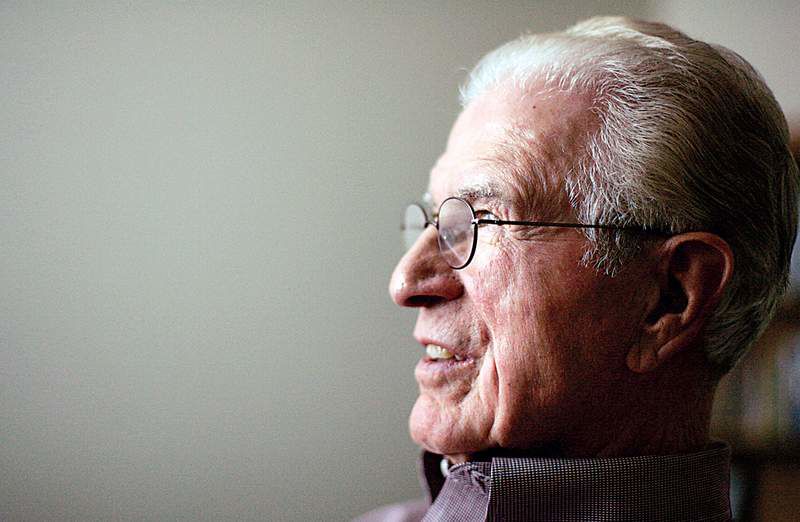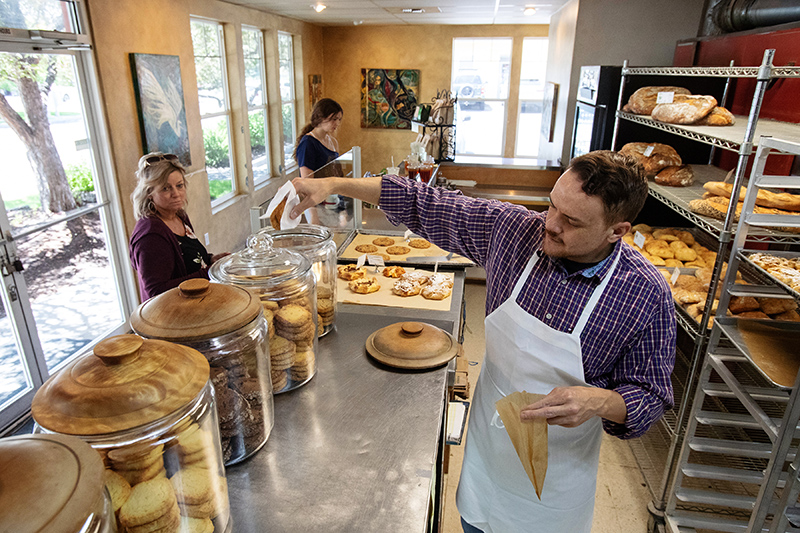From a near-fatal motorcycle crash to walking again, Bend man ‘overwhelmed’ by support
Published 5:00 am Sunday, July 20, 2008

- Clarence “Bud” Carnahan, 81, talks about the challenges he overcame with support from medical personnel, friends and family, when a year ago, a motorcycle crash in British Columbia left him with two compound fractures in his legs.
An avid motorcycle rider of 43 years, Clarence “Bud” Carnahan planned his final motorcycle trip last summer, and the ride nearly cost him his life.
It was a clear morning on July 16, 2007, when the 81-year-old Bend psychiatrist and his 50-year-old son, Brent Carnahan, were riding their BMW motorcycles on a curvy, two-lane road east of Vernon, British Columbia. Clarence Carnahan said he was paying more attention to the scenery than the road. Moments later, he turned a corner too late and crashed into an oncoming Ford Explorer.
The impact sent Carnahan flying from his bike to the road. He broke the tibia bones in both his lower legs, resulting in two open-wound fractures. But luckily, he was still alive.
“I remember it very clearly, and I was stunned,” he said. “The next thing I knew, people were yelling and cars were stopping. It was probably a minute that came around … and the two ladies (in the Ford Explorer) came over, and I was apologizing to them. It was quite a scene.”
Carnahan was the only person injured. A young woman rushed to his side as he lay bleeding, identifying herself as a nurse and asked how she could help.
“I asked her to stay and hold my hand and keep me calm until the ambulance came,” he said.
He lay on the asphalt for nearly two hours with emergency crews before a helicopter lifted him to the Kelowna General Hospital trauma center in Kelowna, British Columbia, he said.
Wednesday marked the anniversary of the near-fatal crash. While Carnahan’s doctor in Bend says his patient’s recovery was quick for his age, Carnahan says he continues to maintain a positive attitude thanks to support from his family and the community. Local veterans flooded his hospital room in Bend and offered help to the psychiatrist who serves many of them.
Carnahan has lived in Bend for 15 years. He is a contracted psychiatrist at the Veterans Affairs Community Based Outpatient Clinic in Bend. He has provided services for the Volunteers in Medicine Clinic of the Cascades and Central Oregon Veterans Outreach, while currently volunteering at the Hospice Center and for the Bend Kiwanis Club.
Before undergoing surgery in British Columbia, Carnahan said he calmly called his wife, Barbara Carnahan, urging her to stay at home for the time being.
At the hospital, he had titanium rods inserted into both tibia bones. The surgeons had to split his knee caps and insert the rods through the marrow area, before using screws to attach the bone to the rod, he said.
But a problem still remained: How would Clarence Carnahan be transported to the hospital in Bend?
Travel arrangements
Friends and local veterans offered to drive a motor home or van to British Columbia. But thanks to one local veteran’s call, an Air Life medical airplane flew Clarence Carnahan from the Kelowna General Hospital to St. Charles Bend six days later. Barbara Carnahan said a nurse called from the plane, telling her when to meet her husband at the hospital.
Barbara Carnahan’s eyes filled with tears at their home Thursday when she recalled seeing her husband of 58 years for the first time since the incident.
“He said when he lied there on the blacktop for two hours, he said, ‘You know, I’m alive and no one needs me really except Barbara and my kids.’ And he said, ‘I’ve got to get over this. I’ve got to heal,’” she said.
“It was a very emotional thing knowing that I was within an hour and a half of seeing him,” she said.
Barbara Carnahan, an 80-year-old retired nurse, praised her husband’s strength after the crash.
“He’s a very strong person when it comes to looking within himself, and taking charge and not falling apart,” she said.
Carnahan remained in the hospital in Bend for six days before being sent home.
“He knows the miracle from the whole thing. He had bruises but no other fractures,” said Barbara Carnahan, who cared for her husband during his recovery.
‘Very serious’
Dr. Aaron Askew, a Bend orthopedic surgeon, was on call when Carnahan was transferred to St. Charles.
He said Carnahan’s tibia bones tore through his skin, and the surgeons in British Columbia had to thoroughly wash out his wounds before inserting the rods.
“It was a very serious injury. A lot of people get infections,” said Askew, 38. “Some people his age never walk again after that kind of thing.”
Askew said he saw Carnahan for four to five months of rehabilitation until he fully recovered. Clarence Carnahan spent three months using a wheelchair before walking again.
“I was concerned that he would have trouble … and have to use a cane for the rest of his life. I could really tell by meeting him that he was exceptional,” Askew said.
At his home Thursday, the tall, slender psychiatrist showed no sign of injury. Not even a limp.
Now, the only remnants of his near-fatal crash are the faint scars on his knees and legs, and the permanent rods that can be felt from underneath his skin. A small section of empty space on the side of his garage is a reminder of where he use to park his motorcycle, which he planned to give to his son after their trip.
Carnahan totaled his bike and almost lost his life, but he said he’s “blessed by having a great support system” since the crash.
There were 24 visitors — mostly local veterans — gathered in his hospital room in Bend at one point, Carnahan said.
“I felt energized by the people at the hospital, and visiting me and wishing me so well,” he said.
Back to work
Barbara Carnahan said one local veteran in Redmond kept calling to help after the incident, until she requested he build a wooden ramp for her husband to use from the garage to the first floor of their house.
Four weeks after returning home from the hospital, Carnahan went back to work at the VA Clinic in Bend.
“He is so kind to whoever comes in. He can treat everyone with kindness, and the veterans just love him,” Barbara Carnahan said.
When he was 18 years old, Carnahan served as a corpsman on a hospital ship at the end of World War II. From 1991 to 1996, he worked at the VA Medical Center in Roseburg, where he was chief of psychiatry for two years.
Allan MacKenzie, 70, is a retired orthopedic surgeon in Bend and friend of the Carnahan family. He said Clarence Carnahan is respected among the community as the ultimate volunteer.
“When the word of Bud’s accident circulated around Central Oregon, everybody decided to give back to help this icon of volunteerism,” MacKenzie said. “In Bend, I’ve never seen a place where volunteers are so prevalent.”
Ronald Carver, 67, said Carnahan faithfully volunteered at the Volunteers in Medicine Clinic of the Cascades for three years. Carver is a board member of the clinic.
“He is a true gentleman. He’s just a very quiet man but very competent, very caring and careful in what he does,” Carver said. “He was excellent with patients. He related well with all sorts of people in a very nonjudgmental way, I would say. He felt a duty and honor to provide that.”
In an informal letter written one month after the crash, Carnahan recalls the overwhelming support he’s received.
“I have been overwhelmed by the outpouring of love, caring and support which has been abundantly given to me and my family in this crisis,” he wrote. “It has surprised me and has exceeded my expectations. I have been richly rewarded by the reminder of these valuable relationships with family, friends, neighbors and veterans.”






